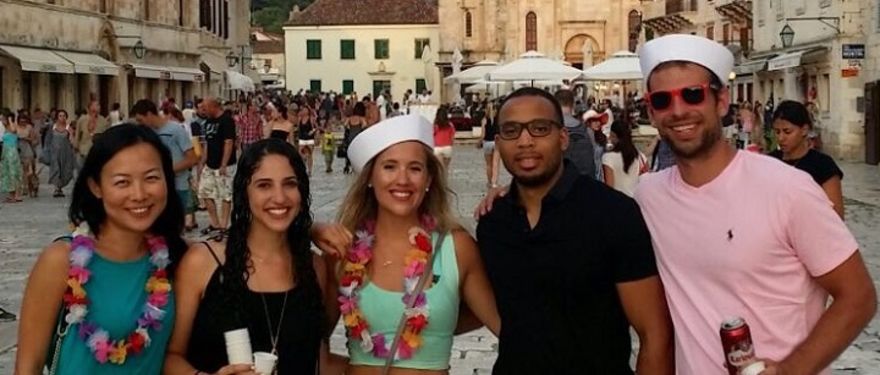Bruce Hampton (MBA 2017) was born and raised outside of Cleveland, Ohio. Growing up in the heartland of America, Bruce was a standout athlete and academic in high school. He went on to play football at Indiana University and, after graduating, he joined a bulge bracket investment bank in New York City. His determination and grit from the football field translated well to the workplace, and he later went on to work in private equity before applying to HBS.
We checked in with Bruce to learn more about his time at HBS and his decision to attend business school.
Why did you want to come to HBS?
After working in financial services for nearly six years, I realized that the skills needed to succeed for the next 20 years of my career were likely to be different than the ones required at the junior ranks. It was important that I further develop my leadership and organizational management skills to transition from an individual contributor to a manager of people. In addition, since my experience had been exclusively through a financial lens, I also wanted to gain a more holistic view of the business world.
HBS was the clear choice for me, given the school’s deliberate focus on leadership development and its focus on shaping a truly diverse student body. After visiting a class, I remember being in awe of the diversity of thought amongst students and how engaged everyone was in the discussion. I quickly concluded that HBS was the ideal training ground to become a more well-rounded business professional.
What has surprised you the most about HBS?
There is a myth outside of HBS that students here are not very inclusive and that everyone treats academics or recruiting as a zero sum game. This viewpoint cannot be further from the truth. Over the past year, I have developed great friendships and have found people to be genuinely interested in helping others.
To that point, HBS reminds me a lot of my college football days at Indiana University. It was often common for two people aiming for the same starting position to train together. The collective view was that our team would be better overall if we pushed each other to become better as individuals. I have found this same perspective to be true at HBS, where people challenge one another in an effort to enrich the learning environment for everyone.
Can you tell us about your involvement with the African American Student Union?
As an RC, I attended the club’s signature event: the H. Naylor Fitzhugh Conference. I came away inspired by speakers like American Express CEO Ken Chenault and previous Massachusetts Governor Deval Patrick. This event reminded me of the strong sense of pride amongst the African-American community at HBS.
This year, I will be the one of two conference co-chairs. When thinking about how best to make an impact at HBS, I decided that taking ownership of such a prestigious event was a great way to not only develop lasting relationships within the AASU community (students, alumni, and faculty) but also raise the excellence bar for AASU by organizing a best-in-class event.
How has HBS changed what kind of leader you are?
HBS has taught me that there is no “one size fits all” solution to leadership. The people you seek to lead are often going to be different than you. Leadership is about finding what motivates each person and then adjusting your leadership style to match.
While a simple concept, I did not fully appreciate how challenging this could be until my FIELD Global Immersion. Not only was I trying to manage a team of my classmates, who were incredibly diverse in terms of background, experience, and ethnicity, but I was also trying to manage a global partner from an unfamiliar region (in my case, China). It is experiences like this that have changed the way I view leadership and have prepared me to effectively manage people in my career.
What is your favorite HBS memory so far?
My favorite memory has to be the end of semester roast my section did for our BGIE class. At the end of each semester, students put together funny skits that gently mock the professor and make fun of how the class has participated over the course of the semester. BGIE can be a pretty intense class, so on some of the harder questions posed by the professor, you could usually hear a pen drop as people mentally prepared their answers.
On this day though, everyone could be seen nearly falling out of their chairs in laughter and cheering on one of our section-mates, who nailed the professor impersonation. This demonstrates the full spectrum of what HBS is all about. One minute you can be having an in-depth, thought provoking conversation with a classmate about world affairs, and the next, you will be having the time of your life.

